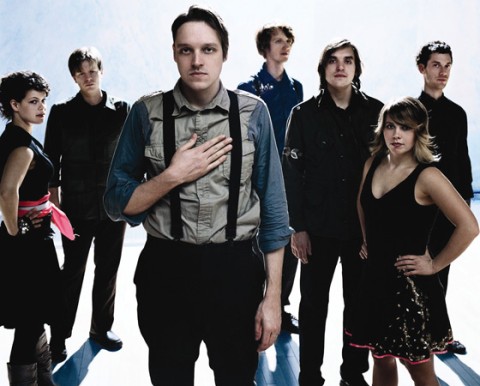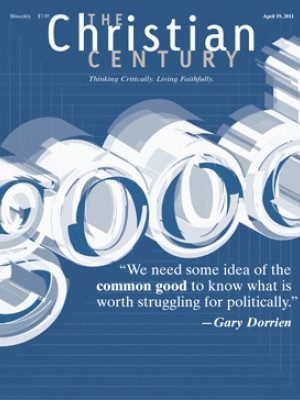Anger and longing

When Arcade Fire won a Grammy for album of the year in February, lead singer Win Butler came to the podium clinging to his identity as one of the band geeks. "We're gonna go play another song because we like music"—just in case anyone had forgotten about the music after watching an awards show in which Lady Gaga emerged from an egg, a short-skirted Katy Perry swung from the ceiling and Gwyneth Paltrow danced in stilettos on a piano. Album-of-the-year Grammys typically go to big-name stars from Nashville, New York, L.A. or London, not quirky, vintage-store-clothed kids from Montreal.
The band closed the Grammy show by performing "Ready to Start," from the winning album, The Suburbs. The song is an apparent ode to the naive artist and a promise not to sell out: "If the businessmen drink my blood, like the kids in art school said they would, then I guess I'll just begin again. You say, can we still be friends?" Characteristic of the band's lyrics, the song casts suspicion on social power, including the band's: "I would rather be wrong / Than live in the shadows of your song."
Read our latest issue or browse back issues.
Arcade Fire is a Canadian group signed to the indie label Merge Records. It has seven core members and often more on stage, and they gang up on vocals and trade instruments that include viola, cello, upright bass, xylophone, glockenspiel, French horn, accordion, harp and mandolin—a mix that makes them impossible to pigeonhole.
On the surface, The Suburbs is a lament about a world in which e-mail, cell phones and chess-playing computers have replaced human contact, connection to the land and even the simple joy of receiving a letter in the mail. "Can you understand why I want a daughter while I'm still young?" Butler pleads. " I want to hold her hand and show her some beauty before all this damage is done." In "Half Light II (No Celebration)," Butler imagines the apocalypse: markets crash and San Francisco is under water. "Pray to God I won't live to see the death of everything that's wild," he sings.
At times Butler draws cartoonish villains, but he also points an accusing finger at himself and all who benefit from a First World lifestyle: "You never trust a millionaire quoting the Sermon on the Mount. I used to think I was not like them, but I'm beginning to have my doubts." Later in the same song he declares, "Wanna wash away my sins / in the presence of my friends."
In light of Butler's other lyrics, this baptism is no empty symbol. He has no patience for religious hypocrisy, whether it's Jessica Simpson's father grooming her as a pop star ("Antichrist Television Blues") or those who are "working for the church while your family dies."
The vulnerability of children is a recurring theme in Arcade Fire's music: "Children don't grow up / our bodies get bigger but / our hearts get torn up / We're just a million little gods causin' rain storms / Turnin' every good thing to rust."
Perhaps it's no coincidence that the last rock band to win the best-album Grammy (in 2006) was U2, whose Joshua Tree album (1987) opens with a yearning for heaven, "Where the Streets Have No Name." Arcade Fire's answer to this yearning is offered in its album Neon Bible: "I'm living in an age /That calls darkness light. . . . Set my spirit free / Set my body free."
Like U2, Arcade Fire expresses political anger. But the stronger link between the two groups is in the songwriter's search for faith. In "The Well and the Lighthouse," the narrator is at the bottom of a well, "serving time / all for a crime I did commit" only to escape, "resurrected, living in a lighthouse." The cylindrical stone well becomes a soul-saving lighthouse—that may be one of rock music's most powerful eschatological metaphors. In the well, "heaven is only in my head," and in the lighthouse, "the lions and the lambs ain't sleeping yet"—but the hope is that they will rest, and side by side.






